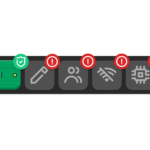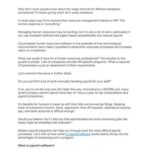To prevent a crippling data breach, prioritize strong passwords and regular software updates. Invest in robust encryption and employee training on security protocols.
Data breaches pose a severe threat to the vitality of modern businesses, often leading to significant financial losses and damaged reputation. In the digital age, safeguarding your company’s sensitive information is of paramount importance. With cyber threats evolving rapidly, businesses need to adopt proactive measures to protect their data infrastructure.
Companies must recognize that no organization is immune and that comprehensive security measures are crucial for long-term resilience. A well-rounded approach entails not only technological solutions but also vigilant staff who are educated and equipped to handle potential risks. Implementing best practices for cybersecurity can be the difference between a secure business and one vulnerable to devastating cyber attacks. The following tips provide an essential framework for fortifying your business against data breaches.
The Gravity Of Data Breaches In Today’s Businesses
Data breaches can irreversibly damage a business’s reputation. Trust is the foundation of customer loyalty. A single incident can shatter this trust. Companies face widespread public scrutiny and lost confidence. Rebuilding a tarnished reputation requires significant time and resources, which not every business can afford.
Financial repercussions of data breaches are often severe. Direct costs include notification expenses, legal fees, and fines. There may be a need for identity theft protection for affected customers. Also, businesses can experience a loss of sales due to customer departures. Over time, these financial strains can mount, potentially leading to bankruptcy.
Assessing Your Data Vulnerability
Preventing a data breach is essential to protect your business. Regular risk assessments play a key role. They help you understand where you are vulnerable. It is crucial to pinpoint what must stay safe. We’re talking about sensitive data which, if exposed, can harm your business.
Identifying such data is step one. It could include customer information, trade secrets, or employee records. You must treat this information with extra care. Use strong measures to guard it. Data breaches are not just a tech issue. They affect your reputation and trust.
Begin by listing all types of sensitive data your business holds. Think about who has access to it. Ask yourself, could someone inside your business be a threat? Don’t forget about outside risks as well. Once you know the risks, you can plan to stop them.
Fostering A Culture Of Cybersecurity
Building a secure business environment demands employee training in cybersecurity. Regular cybersecurity workshops and drills ensure that team members can recognize threats. Practical sessions on phishing, password management, and secure browsing fortify their defense skills.
Creating robust security policies is equally vital. Policies should cover data access, incident response, and remote work protocols. They must be clear and enforced uniformly across the organization. Employees should have easy access to these policies to ensure consistent adherence.

Credit: venngage.com
Encryption: Your First Line Of Defense
Encrypting sensitive information stands crucial in safeguarding business data. Using robust encryption methods, like AES or RSA, can shield your data from unauthorized access. Ensure to encrypt data not only in transit but also at rest. This dual-layer defense strategy makes it harder for cyber criminals to exploit your valuable information.
Establishing strict encryption protocols for data storage devices, including laptops and USB drives, prevents breaches if they’re lost or stolen. Applying encryption across all communication channels, such as emails and instant messaging, adds an extra layer of security. Businesses should regularly update their encryption keys to close any potential security gaps.
Implementing a ‘zero trust’ model which assumes that no user or system is trusted until verified, can work wonders to minimize the risk of a data breach. Training employees on the importance of encryption and secure data handling practices reinforces your defensive wall against cyber threats.
Strengthening Access Controls
Strengthening access controls is vital for safeguarding your business data. Implement multi-factor authentication (MFA) to add an extra security layer beyond just passwords. This ensures that even if a password is compromised, unauthorized access is still blocked. MFA might include something you know, have, or are, such as a code from an app, a security token, or a fingerprint.
It’s also crucial to manage user permissions effectively. Create policies that limit data access only to necessary personnel. Regularly review and adjust permissions as roles change. Use a least privilege approach where users have the minimum level of access required to do their jobs. This reduces the risk of someone accidentally or intentionally accessing sensitive information.

Credit: www.exabeam.com
Keeping Software And Systems Up To Date
Keeping systems updated is crucial for business security. Regular updates patch security holes and protect data. Firms may overlook this vital step amid busy schedules. Neglecting updates risks exposure to breaches. An automated system can ensure updates occur without manual intervention. Automation reduces the chances of human error. It secures data by keeping defenses robust against threats.
Setting up update automation is straightforward. It guarantees software remains current with minimal effort. Companies benefit by saving time while maintaining strong security. Leaders should prioritize the implementation of update automation. This move is pivotal for preventing data breaches. It safeguards the company’s reputation and bottom line.
Preparing For The Worst: Incident Response Planning
Developing a robust incident response plan is the cornerstone of preparedness. Businesses must outline clear steps to mitigate risks. Start with assembling an incident response team. Their roles should be clear. Next, pinpoint key business assets and ensure their protection is unbreakable. Documentation of the response plan is crucial.
Contact lists for crisis scenarios are essential. Keep them updated. Companies need to understand their threats. Regular security audits and assessments are vital. A plan is only as good as its practice. Conduct mock drills to test team readiness. Make sure everyone knows their part in an emergency.
Revising the plan is as important as creating it. After every test, gather feedback. Learning from drills and real incidents is necessary. This helps in fine-tuning the strategies. The goal is a seamless response during an actual breach. Change is constant. New threats emerge. Thus, constantly update your response plan.

Credit: apps.shopify.com
Conclusion
Safeguarding your business from data breaches is crucial. Implementing the seven tips shared here will bolster your defenses. Regular updates, strong passwords, and employee training are pivotal. Embrace these strategies to protect your company’s sensitive data. Act now; secure your business’s future.











